Issue Number 39, Winter 2017-18
Contents
- Winter Sunflowers by John Smith
- Ice Creek by Laura Glenn
- Dark-eyed Juncos (Junco hyemalis) by Diane Sahms-Guarnieri
- Huanglongbing by Samantha Grenrock
- Winter, San Geronimo by Barbara Swift Brauer
- Tempest by Bri Bruce
- Sharing National Geographic with a Stranger’s Child in the Waiting Room by Deborah Fass
- “O Crustacean” by Richard Sederstrom
- February Thaw by Elizabeth Poreba
- And Then Fukushima by Patricia Zylius
- White Hawk by Dion O'Reilly
- How to Hunt Wild Animals
(Saudi Arabia) by Ann Struthers - No Horns, No Trophy
(Sri Lanka) by Ann Struthers - Snow Reclines by Gene Berson
- Primal Visitation by Gene Berson
- Six stories of the world to come in twenty-four words or fewer by Terry Harpold
- Lame Deer, Seeker of Visions
John (Fire) Lame Deer and John Erdoes by Abby Caplin - Undermanned Weatherman by David C. Miller
- The Chase by Stephen Brown
- Kindness by Bruce Hawkins
- another form by Marybeth Holleman
- After Strife by David Axelrod
- Snake Creek by Robert Ronnow
Archives: by Issue | by Author Name

Winter Sunflowers
by John Smith
John lives on the New Jersey side of the Delaware River in the Lower Delaware watershed.

When I take the back road home
and bend around a field of sunflowers,
late summer, it buzzes bright yellow.
Days like this, though, early winter twilight,
windless gray stalks stand so still,
they get lost in the dusk-trodden sky.
The field looks like a cemetery plot;
each charred seedpod, either a disc-
shaped shower head or a black and white
checkered brooch. And up close,
a house fly eye magnified or a wasp's nest
full of empty cubbyholes. Every bloom
that once, chin-up and brilliant,
marveled at the sky as if it were a blue mirror
with its yellow face shining in the center,
now hangs low, humbled, plucked clean
of seed. Last year this time, cherry trees
surprised New Hope with winter blossoms.
Not this turn around the sun. This rotation
evenings descend into nights earlier than ever
and the days are not much brighter.
Yet, to have been granted this bend, this
lucky wheel, and these sunflowers,
once green-stemmed and blazing; now,
blackened. But no less miraculous.
And having done nothing to deserve them.
© John Smith
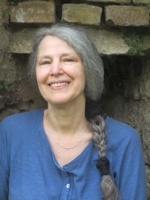
Ice Creek
by Laura Glenn
Laura lives in downtown Ithaca, New York, a short walk from Ithaca Falls in the Fall Creek sub-watershed of the Cayuga Lake watershed.

The green engineer says, knowledge
ruins his appreciation
of beauty. Even sunsets—
shell-pink blurring into lavender,
a nacreous cloud, glorious with pollution.
Weren’t there sunsets
before? Even if sometimes
it makes the sky beautiful,
must I despise the colors?
I worry about warming;
but still, the colors!
Maybe I don’t feel bad enough.
Today, the creek overflows.
Water rises; sump pumps
do overtime, as do firefighters—
bailing out basements.
City workers barge in, smash
ice chunks that jam the creek—
claw them out with the long arm
and huge hand of a scoop crane.
Leafless lilacs along the creek
lose limbs.
Crushes of ice in bitter water rush
under the bridge
lined with watchful neighbors.
Kids pause by roads turned
into barricaded ice rinks.
Toward evening, volunteers pass sandbags—
pile them like plump pillows
to ward off watery nightmares,
fitful sleep. The unfrozen waterfall
roars in the background.
I find a beautiful thing in the mess:
a rain-darkened lilac branch
sprinkled with celadon-green lichen—it twists
and ramifies, narrows at zigzag angles,
bears delicate blooms of fungus,
like cherry blossoms.
Maybe the young engineer was right.
Ice creaks like an old door opening.
Crossing a bridge, absorbed
in the branch I brandish home,
a layer of feelings begins to thaw and mix.
I sidestep a puddle hosting an oily rainbow.
“Ice Creek” appears in the author’s chapbook, When the Ice Melts (2017).
© Laura Glenn

Dark-eyed Juncos (Junco hyemalis)
by Diane Sahms-Guarnieri
Diane lives and writes poetry in Philadelphia in the Tookany-Tacony/Frankford Creek watershed. She delights in watching the return each winter of Dark-eyed Juncos to her garden and, during walks at work, the visitation of various flocks of Canada geese.

They come unannounced – eight to a dozen
bursting white breasts out of black feathers
these whirl wings of winter
as if they are wearing long-tail tuxedoes.
They are marvelous; they are wondrous.
From every angled direction infiltrating
my small city yard. First time I have
ever seen these migratory Canadians
and believe they carry light within them
under radiant white shields that they wear
on dazzled breasts like joy of some sort.
They have made winter new somehow,
even magical, like today under dull dome
of bleak light, pale and gray, thick
as an elephant’s hide. The way their
cotton-candy-colored beaks take turns
pecking and unpecking a Christmas cake
thrown out to them this morning -
baton branches of dogwood swaying
in musical wind, where they eat. Some drop-
dive from cliff of air onto a snow covered lawn
soft as a trampoline; several hurdle a five foot
adjoining fence then swoop low; from atop
garage others hang-glide; and with ease of a trapeze
artist, one sits within wiry diamond of the cyclone
fence. Then one and another as miniature magicians
seem to make themselves disappear -
breasts camouflage as snowy branches
far enough away in morning-light’s mixture:
flurries and snow dust swirl sparkling silvery
ash twirl into ghostly dance.
It’s as though their poppy seed eyes of black globes
hold the whole of creation in their small steady stare.
Entertaining as live theatre. I watch this
unfold and refold itself for nearly two hours.
Mind filming through lenses of my eyes
as your eyes move across this page
as if you were watching a scene
now frozen into the window pane of this page.
© Diane Sahms-Guarnieri
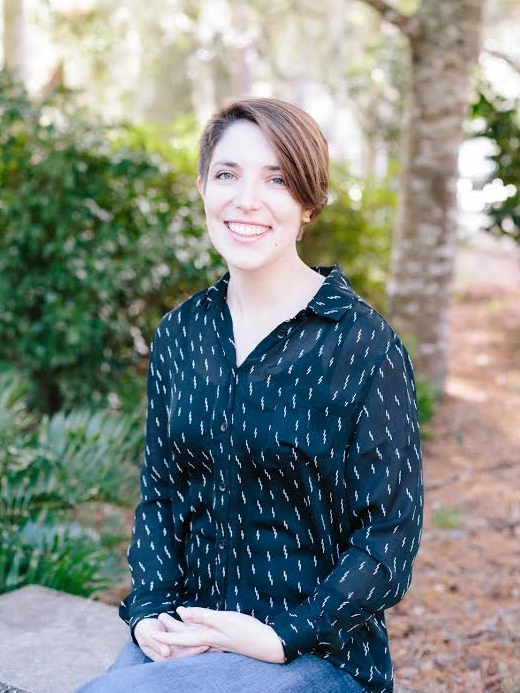
Huanglongbing
by Samantha Grenrock
Samantha lives in the Oklawaha watershed near Hogtown Creek and the Cabot-Koppers superfund site. The canopy is all banana spiders and Spanish moss.

Yellow dragon sickness
would be a disease of lifestyle—
the king on his gouty throne, suffering
the moment’s panacea,
straight mercury. We’d be amused
by that age when all good
medicine was poison
and a bad shipment of rats
sent you heaped on a rickety cart out of town.
Enter, the axe.
Our pestilence takes airfreight under cover
of logistics. The dragon is a psyllid,
a louse. Mouthparts inject yellow moods
into the phloem, trees blossom
at the wrong time of year. Oranges, chronically
unripe, metabolize the investor’s future
self. Gold rises
in the vein. In the grove, that’s the sound
of fruit dropping from the branch.
Slow decline is pathetic in the ancient sense.
© Samantha Grenrock
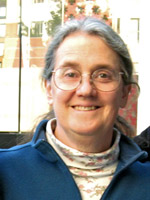
Winter, San Geronimo
by Barbara Swift Brauer
Barbara lives in the Lagunitas Creek watershed in the San Geronimo Valley, the last un-dammed headwater tributary of Lagunitas Creek. Her home is within earshot of ephemeral and year-round creeks, just down the road from the fish ladder where coho salmon can be seen along their annual journey upstream to their spawning grounds.

They are walking dry footed
on the bottom of Nicasio Reservoir.
Rocks in the silent creek jut
like the ribs of a starving horse.
The fish ladder is a skeleton of concrete.
The salmon do not come.
These short winter days, the sun
clicks on like a furnace, clicks off.
The frost forms on the windows, the dying
rhodies, ice in the unemptied bucket.
They are walking dry footed
on the bottom of the reservoir.
Up on the ridge the worried hikers
pass with a guilty stride. The road
beneath their feet, scrabble
and treacherous footing.
Scrub jay, towhee and robin
scratch open the dry soil in the yard.
The new moon fattens in a cloudless sky
rests in the bare branches of the oak.
They are walking dry footed.
The salmon do not come.
© Barbara Swift Brauer

Tempest
by Bri Bruce
Bri is privileged to have grown up beside the towering redwoods of California's Santa Cruz Mountains and now resides only a few steps from the Pacific Ocean that unfailingly feeds her work and forever runs in her blood.

Through the night the trees rocked
to and from, boughs bucked and pitched
against one another and I remember
thinking it sounded like weeping.
At first light I left the hilltop for
the shadows of the canyon. The river
was frenzied, filled with leaves
and waves and mud. I stood for a time
at that maelstrom, where it boils as it greets
the sea. When I turned to leave
I found the owl’s nest had fallen
from the branch that embraced it,
torn away from the old fir in the storm,
the knot of it resting at its roots.
Tonight the moon is full. I trace
its course through the sky beyond
the window in my sleeplessness, a square
of moonlight at the foot of the bed, later
waking to find it has shifted and I
am bathed in it. I am imagining the owl
in the tall four hundred-year-old Douglas fir,
standing sentinel in the black of the night
beneath a smattering of bright stars.
© Bri Bruce

Sharing National Geographic with a Stranger’s Child in the Waiting Room
by Deborah Fass
Deborah lives on the San Francisco peninsula, about a mile northeast of Pulgas Ridge, between Greenwood Creek and Cordilleras Creek, in the Cordilleras Creek watershed.

We think the elephant is being brought to his knees,
the photo showing his collapse, the gash in his thigh.
Here’s the helicopter, the Mobile Veterinary Unit,
landing near the sedated bull, who, while his kin wait
off to the side, lies unconscious, great tusks
pointing nowhere.
Torrential downpour, first of the season.
Vets tend the open wound, remove dead tissue
around the arrow hole.
But he is getting up. Struggling
to raise his enormous bulk
from the mud, front legs straight,
back legs bent. On his knees.
He’s praying, the girl says.
He pushes into the slippery earth.
© Deborah Fass
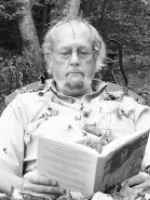
“O Crustacean”
by Richard Sederstrom
Richard was raised and lives in the North Woods of Minnesota and the Sonoran Desert of Arizona. His residences include the Mississippi, Crow Wing, and Salt River watersheds: a very big one, a very small one, and a dead-ended one, all variably enchanting and variably endangered.

Chitinous cousin to our hemichordate memories
remind us of our intimate
cellular closeness to every other cell,
our own pasts rendered into fibrous hues of keratin,
our hostile distance carefully composed in
anodyne gesture-armored courtesy.
Scales. Horn. Pre-cancerous
connection to the first
aggressive cellular mutation.
It is time we were made aware of our state
in the great microbial condition.
It is time we meet some antecedents:
Old Dogs from ancienter pasts.
Opabinia, far-and-near sighted.
Dvinia, small, Earth-sheltered.
A new trick every epoch or so.
Tricks for the next Big Event.
Opposable thumb, binocular vision.
Then the same old Extinction again.
Life roars.
Earth yawns.
Gapes.
© Richard Sederstrom

February Thaw
by Elizabeth Poreba
Elizabeth lives on the 14th floor of an apartment building within the Lower Hudson watershed. Along this entire 153-mile reach, the Hudson is actually a tidal estuary rather than a river.

The brook is a white thread become glassy lava
reflecting light’s love for water, sentimental
in rainbows, harsh here, glinting
on a tumult, thin and colossal, an aria.
She could be in love or dying,
language unknown but feeling
familiar, a wave, a leaf
released to the rush,
snow to liquid, heart to mouth
all transparent —
this moment, her singing,
the waters swelling
and all melting headlong.
© Elizabeth Poreba
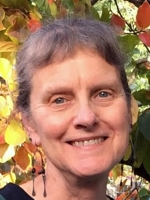
And Then Fukushima
by Patricia Zylius
Patricia has lived in the same house in Santa Cruz, California, near the mouth of the San Lorenzo River for 47 years.

So let us go down singing,
howl with humpbacked whales,
take up the click and whistle
of wandering dolphins.
Let doves’ laments thrum through us,
cry of the red-shouldered hawk
pierce our voices bloody.
Let us moan among soughing trees,
pin black notes that fly from crows
to our bare breasts.
Praise the fugue makers, gray-faced mothers
croaking lullabies over fevered babies.
Let our tongues clack cricket percussion.
Drum thunder, bellow elk.
Let a wild requiem rise in our throats.
© Patricia Zylius
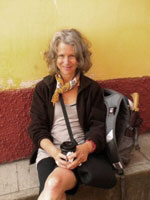
White Hawk
by Dion O'Reilly
Dion lives in the Soquel Creek watershed on a stream-cut terrace covered with a thin mantle of alluvium on a ten-acre triangular plot between Soquel Creek and its tributary, Love Creek.

The mourning doves cooed
their question—Where? Where?
but today, silence.
I filled the feeders
just after dawn, saw the patch
of fluffy down
on the grass below.
One wing feather with a black dot,
told me who died.
Probably a hawk—
my favorite white one,
the leucistic one—
plunged from the sky,
snatched up the dove
settled on the pine,
stood, gripping the blood-
pink neck, and shrieked
a call echoing
down the long valley.
That piebald raptor—
the one I’ve watched
for years, proud that she
chose to live above my field,
as if she were mine,
a totem, my emblem of grace,
the one who snatches me
out of my thoughts,
stuns me on mornings
when I wake, dull, frightened
by my own emptiness,
how sharp and thin
the edges I balance on.
I hear her
shrill and alone,
drifting on the warm thermals
like the outstretched palm of a ghost.
© Dion O'Reilly

How to Hunt Wild Animals
(Saudi Arabia)
by Ann Struthers
Ann Struthers lives in the Indian Creek watershed in Cedar Rapids, Iowa, where the Cedar River eventually runs into the Mississippi. The Iowa legislature is currently attempting to undo or thwart environmental rules protecting the state's water.

Herds of gazelles, sand-colored dancers,
leap across the desert, but their delicate legs cannot outrun
Land Rovers driven by the young princes,
white kaffiyahs thrown back from their eager faces.
High-powered rifles aim: blood spatters the desert;
prize heads decapitated; carcasses bloat in the sun
for buzzards, kites. Buffalo Bill’s ghost
oversees the slaughter. He has not witnessed
so much gore since he murdered the Nebraska buffalo.
The princes live well, collect trophies for their desert palaces,
learn to shoot the mountain ibex and the shy oryx
from helicopters. No creature escapes.
The golden desert rabbit huddles in its den;
jerboa hastily drinks its morning dew,
even the viper and sand cobra shudder.
© Ann Struthers

No Horns, No Trophy
(Sri Lanka)
by Ann Struthers
Ann Struthers lives in the Indian Creek watershed in Cedar Rapids, Iowa, where the Cedar River eventually runs into the Mississippi. The Iowa legislature is currently attempting to undo or thwart environmental rules protecting the state's water.

Meeminna, miniature, toy Mouse Deer, one foot tall:
velvety buff brown coat, striped or
spotted white as if embroidered with silk.
Beauty is his country and Caution his
house and home. By daylight he snuggles down
in jungles where spotlights of sunshine
freckle the foliage-strew floors.
His severed head is not displayed in Sri Lanka’s villas
for Meeminna has no horns, no great candelabrum racks
the great boasters must have wild boar
with his murderous tusks,
water buffalo’s horns of homicide,
slithering leopard’s rosette pelt to prove
hunters superior to the hunted.
Meanwhile, Mouse Deer, wary of the mongoose,
of dogs, feral cats that stalk him, slips through
lazy shadows, relieved to be left out
of The Elect, emerges at dusk to
The Edge of the World on Horton Plain, browses on
delicate grasses. Startled, he leaps back
to obscurity, writing half-ovals
on the silvery air.
© Ann Struthers

Snow Reclines
by Gene Berson
Gene lives in the northern California foothills in the Yuba River watershed. Everyone goes to the river. Like a temple, with its falls its rapids its green pools, it seems to restore everyone in a personal way. We feel our kinship through it.

along the honeysuckle
a womanly figure
melts, each flaring drip
a wet cold spark
runoff from the roof
trickling in the drainpipe
the sun burning
ninety three million miles away
incidentally warms my hand
melts my snow queen
to quench the plant
her lesson for me
is how to relax
as you give yourself away
a figment of light in what you let fall
away, oh
she’s destined to disappear
(if I sit here if
I sit here long enough . . .
I’ll not only see her go
but feel her hand slip
from its sleeve of ice in a vapor
take mine and lead me to an iron bridge
silkened by frost)
she’s both metaphor
—a glittering wheel of snow
turning in the untended garden
and a form of water
you may freely
regard this spectacle as mere phenomena
which it is, or accept it as a vision,
a shapely woman stretching
into luxurious languor
which it is, but you
what are you, then, sitting in your chair
on your deck drying out, en délire with the spinning
wheel, in the snow and sun
everything dripping, sparks crackling in the snow,
branches leaning, branches fallen
bits of mossy bark scattered everywhere?
you are the part of it
that pretends
the wide-awake dreamer
on which the future depends
© Gene Berson

Primal Visitation
by Gene Berson
Gene lives in the northern California foothills in the Yuba River watershed. Everyone goes to the river. Like a temple, with its falls its rapids its green pools, it seems to restore everyone in a personal way. We feel our kinship through it.

we woke to hear soft rain drip
onto the damp deck
where pollen coagulated
into small yellow gobs
even on the backs of our visitors—
salamanders—
silent and stealthy
had surrounded our house
gradually drawn around us as we slept
an aura of protective
prehistoric calm
quelled our anxious dreams
until even our bones
felt as still as the mountains. it's true
mountains were once people
now here we are
listening to rain
hardly able to speak. please
tap the planet gong
gently with your knuckles
as you pass by to the kitchen
to mark our being with each other
I will listen to your journey
trail you down the hallway
and there will be no within
without you.
© Gene Berson
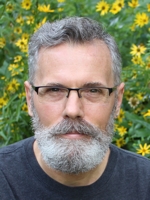
Six stories of the world to come in twenty-four words or fewer
by Terry Harpold
Terry lives on the border of the Santa Fe and Ocklawaha watersheds and teaches at the University of Florida. He is the founder of UF’s “Imagining Climate Change” initiative

All night the fever gave her uneasy, misshapen dreams. Or maybe she had been awake. It was hard to tell now.
You pull and push on the handle, like this. Just keep the bucket in the center so you don’t lose any.
Dipu steered the canoe slowly toward the floating clumps of rice stems. Retreating to the silt, prawns churned panicked ripples as he got closer.
The coral bed was gray and white and still, as far as the sunlight reached. It was beautiful, in a way.
There’s room for another, but she’ll have to share. And there’re no more blankets.
Mirana knew that it was time to leave when the dark water began to spill under the doorsill.
© Terry Harpold

Lame Deer, Seeker of Visions
John (Fire) Lame Deer and John Erdoes
by Abby Caplin
Abby resides on a sand dune in the Laguna Puerca watershed on a peninsula between the Pacific Ocean and the San Francisco Bay surrounded by the sound of white crowned sparrows, crows, hummingbirds, and a flock of wild parrots.

I learned a lot from Lame Deer,
Lakota holy man already
old in 1970.
About Wakan Tanka
who cares for us, gives us
rain, stones, insects,
four-leggeds.
Steam is living breath, he said,
stirring the pot.
The world is round
like sun fire,
animal bodies,
the peace pipe bowl passed
from hand to hand
around the seven campfire
circles of the Sioux Nation.
The Wasicun
fat-takers’ world is a jail,
sharp-edged and boxed-in.
Office buildings, locked doors,
computers, cars,
rush hours.
He told of his Santee friend
who pissed on Roosevelt’s nose,
protest for perverting
the Sacred Black Hills,
told John Erdoes how Custer’s
lone surviving soldier went crazy
not from killing, but from watching,
just after payday,
all those frog skins, greenbacks
scattered on the field,
tinder for lighting
dried buffalo chips.
Listen, he said,
I saw this in my mind—
the time is coming
when, one day,
the electricity will stop.
© Abby Caplin

Undermanned Weatherman
by David C. Miller
David lives in La Porte County, Indiana, which, according to the federal government, is the farthest point in the U.S. from any ocean and has the highest number of cloudy days, for which reason during WWII they chose to build a giant munitions factory there where the enemy would be least likely to find and bomb it.

Thunderous sunshine,
struck the region unexpectedly,
overnight.
We sent out the satellite trucks,
but lost them in the unseasonable fog.
We half-expected,
this front to move there,
or perhaps over there.
I guess the computer modeling…
Anyway,
tomorrow looks pretty much like yesterday,
but since we got that wrong, who knows.
The current pattern,
is reminiscent of what was seen in ’75,
when my wife consented to marriage,
thus proving climate change is real.
More on this at ten, or eleven, not really sure.
Apart from that,
We are predicting more,
forecastastrophies,
for the unforeseeable future.
© David C. Miller
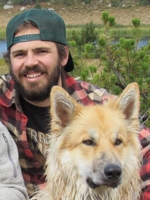
The Chase
by Stephen Brown
Stephen lives in the sagebrush-covered foothills of the Beartooth Mountains, where the Rock Creek watershed spills from Montana’s tallest reaches of granite and empties into the Yellowstone River.

My pup’s run off again,
after deer. He can’t help himself.
I can hear him screaming
joyous as he hops through snow,
crossing barbed wire. His bounds
are akin to an ancestor,
closer than anybody here cares to see.
This is where the first wolf
reintroduced to Yellowstone
was shot down.
His paws look it. His ears look it.
His stride looks it. His fur looks it.
He looks it. And those trucks,
parked down on the road,
they know all of the above.
But they see me, running,
falling in snow drifts, following
the tug of my coonhound.
I got no clue where the wolfdog is,
but we’ve found three big bucks,
flushed them from trees,
and I haven’t heard a gunshot,
yet. We are still on the trail,
big prints leaving evidence,
that would leave a rancher
blood thirsty. You’re just having fun.
but when I find you, I’m gonna hit you.
I’m scared, waiting for a gunshot,
when you trot up behind me.
© Stephen Brown
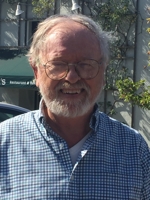
Kindness
by Bruce Hawkins
Bruce lives between the Cerrito Creek and Baxter Creek watersheds near the eastern shore of San Francisco Bay.

Oil drips in the dark pit.
Like nervous sweat the wet
patch widens and I drop
in the match, watch it catch,
the flames low, slow, creeping
then a batter of wings.
I clang the door shut
against what is leaping
at me, look that no feathers
have fallen to the floor.
This is kindness which, kept
in its cast iron cage,
warms the small house, allows
me to undress, listen
to the midnight wind, sit
complacent as a rose,
while it exacts a price
so small I hardly notice.
© Bruce Hawkins
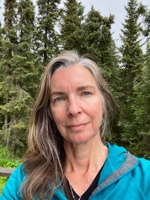
another form
by Marybeth Holleman
Born near the Cuyahoga River just before it caught fire, raised in the Great Smokies near the rolling waters of the Upper French Broad, Marybeth transplanted to Alaska’s Chugach Mountains after falling head over heels for Prince William Sound—just two years before the devastating Exxon Valdez oil spill changed her life trajectory.

shards of ice splitting
from the glacier’s face
released from centuries
of hard labor. palpable
the relief, as sharp angles
shed to shining curves,
drips and puddles slip
into ocean, stream, lake.
purple clouds and the rain.
rounded rocks stippled
with lichens. alders and
willow wave. spruce crown
with eagle’s nest blooming
blue forget-me-nots.
cormorant dive for herring,
humpback calf rolling
with a pod of leaping porpoise.
lion’s mane jelly pulsing
over lemon-green popweed
and barnacled rock.
many hands grasping
big blue ferry’s railing,
steady across spacious
seas toward the city
where they wing to distant
homes. grassy shores
and blooming roses. fields
of wheat and rising dough.
amber glow of cut glass
windows sifting winter’s
snowsoft light. and I
upon this rocky headland
drinking glacier melt.
© Marybeth Holleman
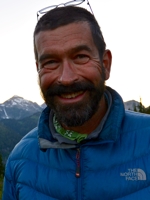
After Strife
by David Axelrod
David has lived for 30 years in the Columbia River Watershed in the upper reaches of the Grande Ronde River between the Blue and Wallowa Mountains. His house is on the steep south bank of an abandoned meander, where the river flowed at the end of the last ice age.

I didn't expect this
quiet, these rows of empty
boxcars, rails and sidings
overgrown by thickets of dogwood.
At far crossings, debris fires
billow—sporadic and strange,
set ablaze by whom?
And why?
In the valley, fog rimes
the galleries of cottonwoods
along the river, limbs glimmering
old moon, new or full,
and once or twice each day,
whatever a day is
in this afterlife, a random wave
passes through barren
crowns of trees and dusts
the sere grass in hoar.
No center holds. Peripheries only
and a gradual blurring—
what was that, scuttling
sideways along a sagging wire,
its wings or shoulders hunched,
a lump of quills or damp fur?
A white horse takes a roll
in snow, shudders as it stands,
then disappears into a fold.
And far deeper, in the remote
and unplanted tillages,
dry thistles scrape against
the plowshare
where it pulled to a halt.
© David Axelrod
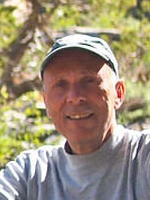
Snake Creek
by Robert Ronnow
Bob lives in the Hoosic River watershed, a tributary of the Hudson River. He observes streams hurrying or hesitating toward the Hoosic, and an occasional black bear, porcupine, barred owl or pileated woodpecker, during his morning rambles in the Taconic Mountains.

Tired body aches. Long walk on starry night–
ears attuned for bear at creek, or cougar.
Nothing, not a doe.
But that afternoon
came upon a healthy young buck in a meadow.
High up. And a hawk left a feather for me.
Old, old stands of lodgepole pine, grey bark
like wrinkled hides of elephants. Thick carpet
of dead needles.
Thirst. Sit at snowbank
for an hour eating snow. Burn tongue.
To soon after stumble upon a pond and the place
that a creek springs from the mountain. Water
indescribable. Eat ravenously and drink deep
gulps.
Climb highest rocky peak at dusk. Razor-back
ridge. Mother hawk scream nearby. Must
backtrack and then go straight down near dark
feet fall through layers of scrub pine, hands
grab for the live stalks only support against
broken bone.
Choose steep narrow bed of loose rocks,
surely waterfall in some other season and descend
on ass and all fours, feet first always fearful
it will end in an uncontrollable hundred foot drop.
Trickles of water nearing bottom.
Cracked hands, raw
behind, cross final snowbank and attain road
along Snake Creek.
© Robert Ronnow